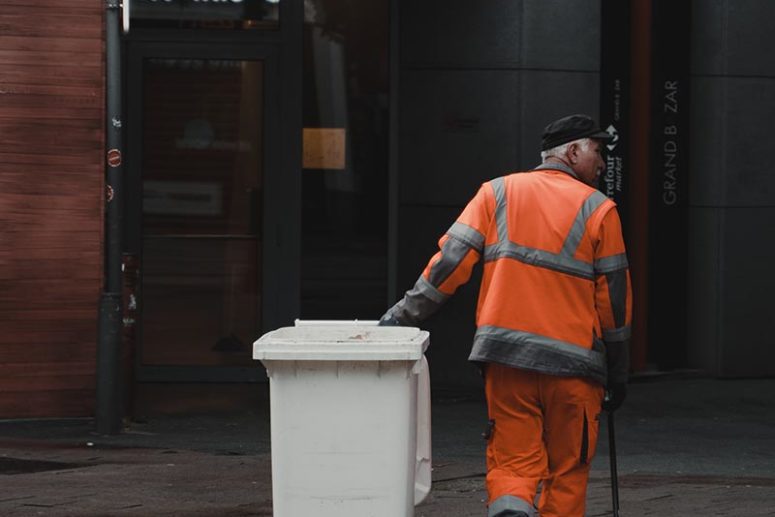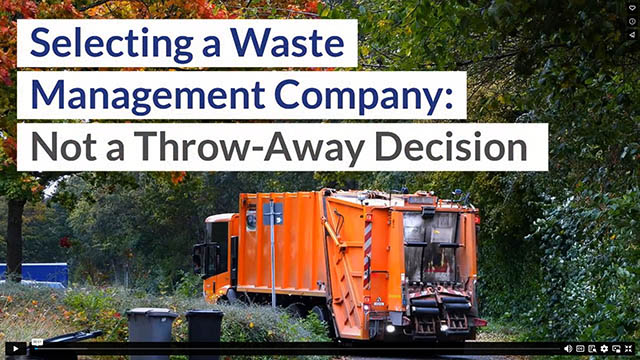
Selecting a Waste Management Company: Not a Throw-Away Decision
It can be easy to dismiss waste disposal as unimportant, but your choice for this service can have a big impact on the environment and your budget, so it is important to get it right. Here are eight factors to consider when making the selection.
1. Types of Waste Serviced
Make sure the company you choose can properly handle all the waste materials you generate. Food waste, bio-waste, syringes, and construction materials must be handled differently. You need a waste disposal company that will work with whatever it is you are throwing away. Knowing what kind of waste you generate and making sure your waste management company will accept them are essential first steps.
2. Recycling Needs
Reducing the amount of waste you send to landfills is a great way to operate a more sustainable, environmentally friendly business.
Here’s a list of just some of the types of materials that can be recycled:
- Paper – Used paper is broken down with water and chemicals until it becomes pulp, which is then used to make new paper. Reusing paper fibers means more trees stay planted and growing, sustaining animal habitats and removing carbon from the air.
- Plastic – Waste and scrap plastic is processed and turned into new plastic products. This includes items like bottles, containers, and thinner PVCs.
- Glass – Some states, including Utah, do not include glass in their regular residential recycling. That doesn’t mean that it can’t be recycled. Glass of any shape and color can be given a new life if properly handled and sorted.
- Metals – Steel, aluminum, and other metals can be repurposed. Most often this involves melting and forming it into new shapes.
- Cardboard – Cardboard is made of thick sheets of paper layered together. The recycling process is similar to that of paper.
- Concrete – Concrete rubble can be reused for other construction purposes.
- Yard and Green Waste – Leaves, grass trimmings, branches, and other natural waste materials are decomposed and recycled or used as compost.
- Bricks – Once crushed and broken down, these are used to make new bricks.
- Wood – Wood can have a new life as a building material or be processed into mulch or pulp. As with paper, wood recycling helps prevent additional trees from being cut down.
This list is far from comprehensive, so when in doubt, ask. Use your waste management company’s expertise to identify what waste you can recycle. Choosing a company able to help you reduce your environmental impact can help reduce your waste management needs and support a clean, healthy environment.
3. Special Handling Fees
Some materials, like batteries and tires, require more lengthy, complicated processes to be recycled or disposed of properly. Ask about additional fees for special items and whether there are any materials your waste management company won’t accept.
Appliances, refrigerators, TVs, and air conditioning units commonly incur additional fees. If you have any hazardous materials, paint, fluorescent lighting, batteries, or fuel or propane tanks, make sure you inquire about those specifically since many services will not take them, even for an extra charge.
4. Education
Does your potential waste management provider help educate your team? With so many exciting new options for recycling, it can be challenging for customers to determine what can be recycled and to properly separate materials. Look for a company that provides education on proper handling and sorting of materials to ensure everything that can be recycled makes it to the proper place. With their guidance, you can minimize your trash and your environmental footprint.
5. Government Regulation
In addition to making sure your waste is handled in the most environmentally friendly ways, your waste management company needs to comply with local, state, and federal regulations for waste disposal. Make sure any provider you consider is up-to-date on all relevant laws.
6. Reliability
The last thing a business or homeowner needs to worry about is overflowing dumpsters. They are smelly and unsightly. As you search for a waste management company, ask about their on-time ratings. When possible, check with Yelp or other review services to see if a company has a history of complaints about late or missed pick-ups.
7. Flexibility
Ask about how often they pick up and whether you can add additional trash pick-up when needed. Do they only provide a weekly service? Can you rent a large dumpster for a short-term project? The most effective waste management company will provide a customer-specific solution for your trash.
8. Container Types
An individual homeowner’s needs are vastly different from those of a large industrial manufacturer. Some waste disposal companies will offer smaller rolling totes, and others will provide massive 40-yard roll-offs or even industrial trash compactors.
Selecting a disposal container that is too large can unnecessarily inflate costs, but too small a container can require more frequent hauling, leading to higher expenses. Your waste manager should be able to help you find the size that works best for your needs.
Selecting a waste disposal company can feel like a throw-away decision but making the wrong decision can trash your bottom line. Make sure you find a provider that can meet all your needs and work with you to find solutions that are kind to the environment and your budget.

